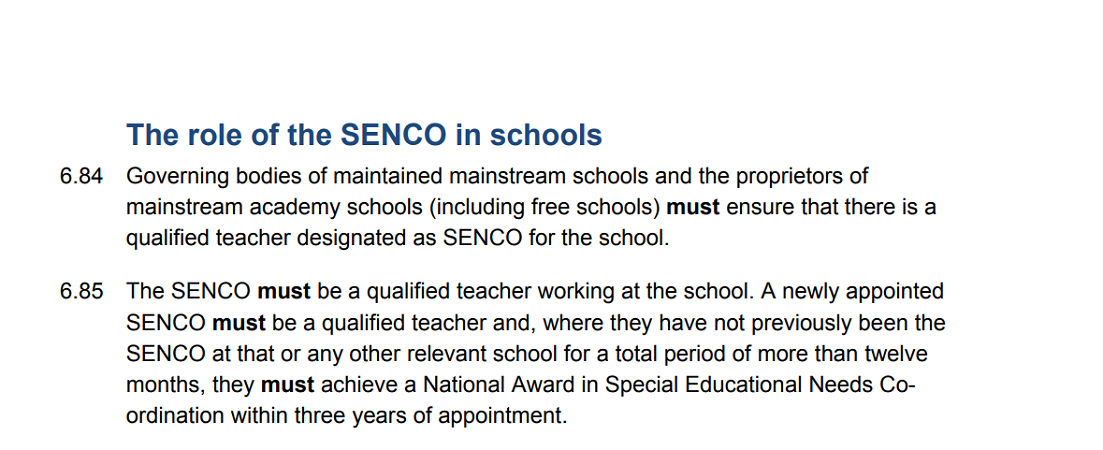
CREDIT: This story was first seen in Tes
Charity claims schools are sharing SENCOs, against statutory guidance, Tes reports.
Ofsted is being urged to revise a policy that allows schools to be rated “outstanding” even if they breach legal guidance on provision for pupils with special educational needs and disabilities (SEND).
Statutory guidance for schools is set out in the Department for Education’s SEND code of practice.
The code covers rules on exclusions and also states that each maintained school or academy must have a Special Needs Coordinator (SENCO) who is a member of staff and a qualified teacher. There is some leeway for “smaller primary schools” to share a SENCO.
But Adam Boddison, chief executive of the special educational needs charity Nasen, says he knows of schools that are in breach of the code – either because the school is not employing a qualified teacher as a SENCO or because secondary schools are sharing one between them.
However, he is concerned there appears to be no enforcement or penalty associated with this and nothing to stop a school in breach of the code from being rated “outstanding”.
When Mr Boddison raised his concerns with Ofsted, he received a reply from Matthew Barnes, the inspectorate’s lead on SEND, who confirmed that inspectors had no legal duty to check whether a school was complying with the code of practice.
Instead, inspectors had to consider only whether a school met the needs of pupils with SEND, in which compliance with the code would be a “relevant factor” but not a limiting one.
Mr Barnes’ email stated: “If a school has taken the decision to appoint a non-qualified teacher as SENCO, this would represent a breach in the legal requirement as set out in the code of practice.
“A school inspector would have to take this into consideration when judging leadership and management. Nevertheless, if provision for pupils with SEND is evaluated as strong, the lack of compliance would not limit the judgement that could be made.”
Mr Barnes added that inspectors are required to complete specific training on how to check a school meets the needs of pupils with SEND.
Inspectors should not have a preferred style for how schools organise their provision, including for pupils with SEND, he added.
“Therefore, it is not for Ofsted to stipulate how dedicated a SENCO should be to a single school, but to evaluate the impact of the decisions leaders and managers make on provision for pupils with SEND and their outcomes,” Mr Barnes concluded.
But Mr Boddison said the watchdog should reconsider its stance when drawing up a revised framework for inspection which is expected in 2019.
He said: “Whether Ofsted is an inspectorate or a regulator, the fact remains that they are a major player in determining school priorities.
“In stating that a school could still achieve an ‘outstanding’ grade despite being in breach of the SEND code of practice, Ofsted is at best condoning poor inclusion practices in schools and at worst encouraging [them].”
He added: “Schools which exclude learners with the most complex special educational needs or disabilities can more easily demonstrate that their provision for the pupils with SEND that remain is strong.”
A DfE spokeswoman said: “All schools should have a SENCO. If a school is found to not have a SENCO in place, the Education and Skills Funding Agency will get in touch with them to follow this up and make sure they have one in place if it is an academy – and the local authority will get in touch if it is a maintained school.”
Source: SEND code of practice, DfE
Don’t forget to follow us on Twitter, like us on Facebook, or connect with us on LinkedIn!


Be the first to comment